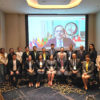The new APRACA Secretary General assumed office with effect from 01 December 2017 who was selected at the 67th EXCOM meeting and 20th General Assembly held on 10th November 2016 at Kathmandu, Nepal. Upon assuming office the Secretary General sent out a letter to all APRACA members regarding his vision for the next 2 year of his tenure.
The new APRACA Secretary General assumed office with effect from 01 December 2017 who was selected at the 67th EXCOM meeting and 20th General Assembly held on 10th November 2016 at Kathmandu, Nepal.
Upon assuming office the Secretary General sent out a letter to all APRACA members regarding his vision for the next 2 year of his tenure. The emphasis should be on the APRACA Strategic Plan for the period 2013-2018 and proposed to develop a three pronged approach to make APRACA a relevant institution in the Asia-Pacific region: (a) Understanding the need of the member institutions-The Demand side approach and member servicing; (b) Emphasis on Research, Publication, Networking and upgrading the Knowledge Management Platforms and (c) Focus on financial sustainability of APRACA by engaging more with the member institutions and exploring new institutions to join APRACA.
The Secretary General (SG) attended the 5th World Congress of the Rural and Agricultural Credit Associations (RACAs) led by AFRACA (African Rural and Agricultural Credit Association) and supported by the four other RACAs (CICA, APRACA, NENARACA, ALIDE) held in Dakar, Senegal on 24 and 25 November 2016. He presented the APRACA’s experience of recent documentation of Rural finance best practices in Asia-Pacific region and also moderated one session on risk management in agriculture. NABARD announced its willingness to host the 6th World congress which will be co-hosted by APRACA in 2019.
The SG also visited Huainan Prefecture in China and helped the Huainan commercial bank to train their officials on agricultural value chain finance. The training programme was targeted primarily for the banking officials working in and/or expected to be involved in the Rural Finance Best Practices (RuFBeP) project of IFAD/APRACA with the Huainan Rural Commercial Bank (HRCB). It was also to provide capacity building for students and professors of the Nanjing Agricultural University and the development organizations working on facilitating linkages of the value chain actors with the financial systems in China.















